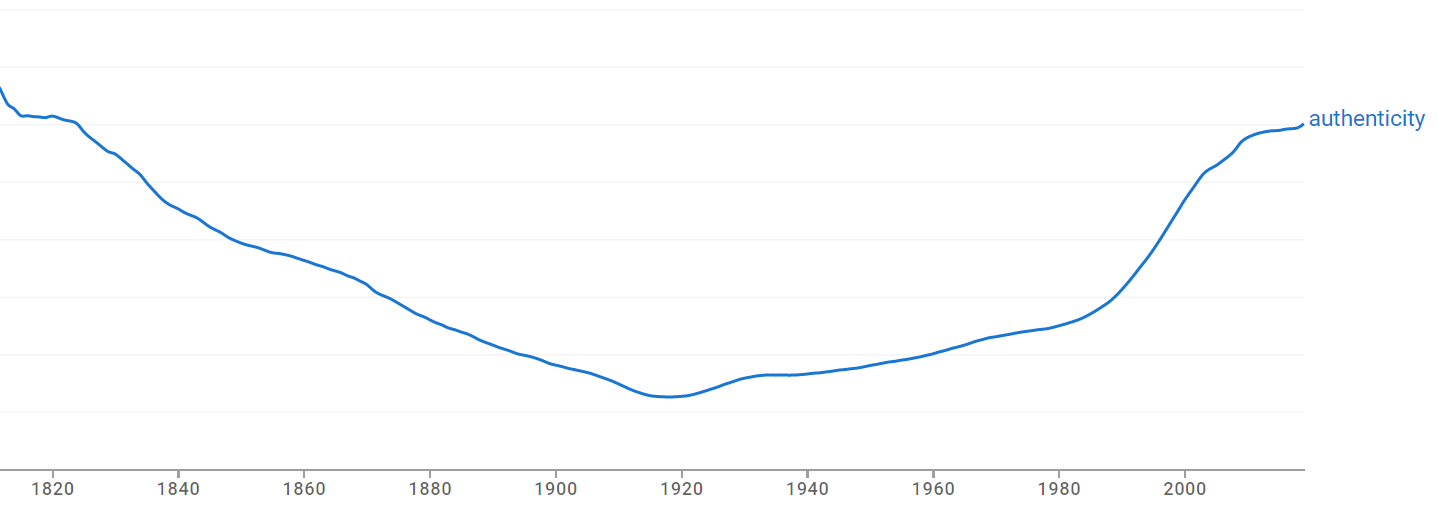Rethinking Authenticity
How it became confused, why it's such a paradox, and why it's so hard to be authentic
Last month I wrote about the realization that I am no longer cool. The thought occurred, “If I’m not cool, what could I be?” Obviously, I can be uncool, but isn’t there something more? Is post-cool a thing? Then it dawned on me. I can be *authentic*.
Authenticity. What a loaded, confused word this has become. All sorts of things proclaim to be and strive for authenticity. Business leaders should be authentic. Authentic Asian cuisine is superior to its inauthentic competitors. And according to The Quinnipiac Chronicle, Connecticut’s last ranked student publication, “Miley Cyrus’ ‘Endless Summer Vacation’ promotes authenticity”. In a world of such frustratingly vague headlines, you have to wonder if the true meaning of authenticity has been lost.
For this month’s post, I want to examine authenticity—how it became so ubiquitous and overextended, why it’s such a paradoxical compliment, and why it’s so difficult to be authentic.
Authenticity Gets Co-Opted by Pop Psychology
Authenticity didn’t always mean what it does today. Prior to the second half of the 20th century, authentic was mostly used to mean “factual”. A common book title from the 1800s might be “The Authentic History of…” meaning a trustworthy, literal, or originally sourced document. It’s only in the last 50 years that authenticity has come to be a character trait, something people could possess. That’s a pretty neat trajectory for a word, and I think most of us find authenticity a pretty meaningful descriptor.
Listening to a podcast the other day, I heard an adolescent psychiatrist describe an interesting phenomenon regarding medical terms. One unintended consequence of our increasing awareness and destigmatizing of mental health has been that words that used to mean very precise maladies, words like anxiety and trauma, are now used to describe all sorts of menial afflictions. They’ve been thinned by overuse, poorly applied by well-meaning individuals, and twisted by the ignorant.
I think the same thing has happened to authenticity. What has been a fairly straightforward albeit modern concept has blown out of proportion, seized upon by pop psychology, like in this quote by Brene Brown, popular author of self-help books such as Daring Greatly and The Gifts of Imperfection.
Authenticity is the daily practice of letting go of who we think we’re supposed to be and embracing who we are. Choosing authenticity means cultivating the courage to be imperfect, to set boundaries, and to allow ourselves to be vulnerable; exercising the compassion that comes from knowing that we are all made of strength and struggle; and nurturing the connection and sense of belonging that can only happen when we believe that we are enough. Authenticity demands wholehearted living and loving—even when it’s hard, even when we’re wrestling with the shame and fear of not being good enough, and especially when the joy is so intense that we’re afraid to let ourselves feel it. Mindfully practicing authenticity during our most soul-searching struggles is how we invite grace, joy, and gratitude into our lives.
It’s a nice quote, and I agree that the advice is sound, but does this all fall under the banner of authenticity? And if so, when did authenticity become so gushy? The quote ends in a completely different place than it starts. The directive goes from “embrace who you are” to “wholehearted living and loving,” and “invites grace, joy, and gratitude” into the life of its practitioners. That could be the outcome of authenticity, but plenty of people go the other way, authentically embracing the worst parts of their behavior under the cloud cover of “well this is just the way I am”.
The Paradox of Authenticity
We typically use authentic as a compliment. We appreciate someone who is true to themselves. You don’t hear the word thrown around for the undesirable parts of society, as in “That’s a really authentic mullet you’re sporting there, partner.” We save authentic to describe positive behavior and attributes.
We also tend to think of authenticity as a choice, just as Brene Brown does in her quote. One can develop, practice, and live authentically. However, this misconstrues a key aspect of authenticity which is that while we can do our best to act authentically, the determination as to whether or not we are successful is not ours. Authenticity always necessitates another party, an authenticator.
This is the central paradox of authenticity. Only others can judge whether we’re authentic. If we’re not careful, authenticity becomes a craft, a performance, accurately appraised by someone other than ourselves.
When we praise someone for being authentic, we’re congratulating them on behaving in a way that conforms to our conception of them. We package up everything we know—where they grew up, their age, their income level, their friends; really, a dozen little micro judgments—and use that to determine whether they present themselves consistently with their environment and past.
Doesn’t everything I described above, the judgment, the social estimations, the performance, sound a lot like the juvenile concept of “cool”? It sometimes feels like authenticity has just become coolness repackaged for adults, as ephemeral, arbitrary, and suspicious as its predecessor.
Should we not care what other people think of us? Sure, but who can live that way? Besides, humans are particularly adept at throwing up blinders to our faults and shortcomings. We rely on others to help us improve and get along with others in this great societal experiment of ours.
Why It’s Hard to Be Authentic
It’s not very easy to be sincere, genuine, vulnerable, and self-assured. I guess this explains all the self-help books on the subject.
One thing that makes living authentically difficult is that we’re always changing as people. Whether that’s slow, incremental change about our fundamental character and beliefs, or whether that’s quicker changes to our hobbies, jobs, or friends, it’s hard to be authentic. This is only complicated by the fact that someone other than ourselves has the final say on our authenticity. We’re often changing what we do, how we spend our time, and even who we are, and other people get to decide, unfairly or not, whether they think these new changes fit our profile. When aspects of our life change, we have to decide whether they feel true to us and navigate communicating and signaling that change to the world so we don’t come off as an imposter or a phony.
Let me illustrate with an example from my own life. While I’d call myself driven, I’m always a little surprised when life exceeds my expectations. I like to think that I’d be satisfied getting to write and read for most of my life, so when things pan out better than that, I tend to feel like an outsider.
I felt this acutely about twenty months ago at an event my company put on. The conference was held at the Gaylord Hotel at the National Harbor in Maryland on the banks of the Potomac River. One night, they put on a reception on the rooftop bar of the hotel. It was a glorious September evening, perfectly temperate with blue skies and views of the gleaming river and the Washington Monument a few miles to the north. I was still newish to my job and surrounded by successful businessmen and women, I felt both out of place and a little in awe that I got to be there. I remember saying to my coworker, “I just never thought I’d do stuff like this.”
I was feeling that dissonance between who I was and the changes that had occurred in my life. Nothing about being on that rooftop felt true to me, the Utah kid who always thought he’d stay in the West, never work in a for-profit business, and more or less be an outsider to this kind of activity. Was I even supposed to be there? That didn’t matter, I was there, and not only was I there, but I was surrounded by hundreds of others who could at any point look at me and ask the same thing - why is he here?
A few conferences later, and I’m a little more comfortable with who I am in this new context of my life, the “professional Miles” side of me. I’ll credit the inevitable passing of time with the way I’ve slowly come to feel like myself. Still, I’ve had a few reflections that I hope are worth sharing:
Where we are and what we do is not as important as who we are. Life is going to inevitably take us into unknown scenarios and lead us to previously unexplored interests. Foreign though these may feel, they aren’t a threat to our self-identity. It’s how we act that matters more.
Others likely judge us much less than we think. I’ve heard it called “main character syndrome.” Yes, we make snap judgments about people all the time, but the amount of time we actually spend thinking about strangers compared to ourselves is negligent.
I try to care a lot less about my external surroundings or circumstances and only pay attention to that internal monitor that flickers a little warning sign whenever I’m acting out of character. When this happens, I can ask myself why whatever situation I’m in is causing me to alter who I am. Do I feel intimidated by someone? Am I surprised by something new and unfamiliar? Whatever it is, I can attempt to reign in any false behavior and try to stay within myself.
In sum, let’s not make authenticity more than it needs to be or misapply it as an adjective. Others are always going to be there to judge us. This isn’t a bad thing unless we let it dictate who we are in the first place. Life is going to mold and shape us in all sorts of unexpected ways, not all of them in alignment with our past. When we get to be the authenticator, let’s show a little grace and allow others to flourish where they want to flourish and go where they want to go.




This is great! The ideas of authenticity and not worrying what others think about you make me think of humility. To me, humility in part means being comfortable with who I am without comparing myself to those around me.
What an interesting article. Just came across it. Yes, I think being authentic needs an authenticator, but I believe that authenticator is us, our assessment of who we are. What can others possibly know about it, when I am or when I'm not acting in alignment with who I am and what I want? The judgement of others is a trap; buying into their judgement even more of one. Thanks for your post.